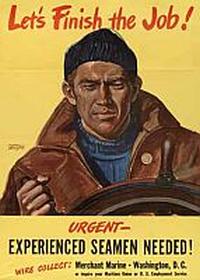 A post from several years ago that is well worth reposting.
A post from several years ago that is well worth reposting.
What was the most dangerous service in World War II? The Army, the Navy, the Marines? In fact, it was the Merchant Marine. 1 in 26 mariners serving aboard merchant ships in World WW II died in the line of duty, suffering a greater percentage of war-related deaths on average than all other U.S. services. Officially, a total of 1,554 ships were sunk due to war conditions, including 733 ships of over 1,000 gross tons. An estimated 243,000 sailors served in the Merchant Marine during the war and roughly 9,500 died either at sea, as the result of wounds ashore or as POWs. During the early years of the war, the loss of merchant ships and sailors to submarine attacks was so great there was a real concern that Germany might succeed in winning the war by starving the Allies of supplies. The mass production of merchant ships in the United States and the parallel rapid training of hundreds of thousands of merchant sailors kept the necessary supplies flowing across the Atlantic.
Despite the importance of the merchant marine to the war effort and extreme dangers, merchant sailors were civilians who did not receive military benefits. Merchant mariners from World War II finally received full benefits only in 1988.
Here is newsreel video from 1943:
Merchant Marines in World War II newsreel and archival stock footage

I cant help but wonder what the numbers would have been if the ships were tested to make the speed of the convoys (or what ever the flotilla was called). After all there were numerous stragglers whom were not able to keep up. As well as other situations where ships thought they could sail with out protection and are now littered across the sea floor. Most of them near the coastline because the US was too foolish to turn off its lights at night. Our ignorance proves how numb we can be through out history.
Great video!
They didn’t get full benefits. No G.I. Bill or anything. They basically get a burial and a certificate that they served in the war.